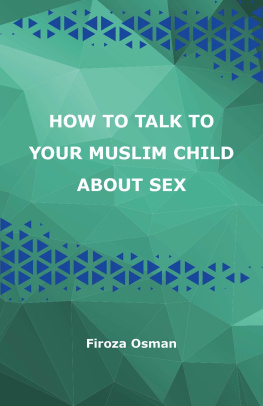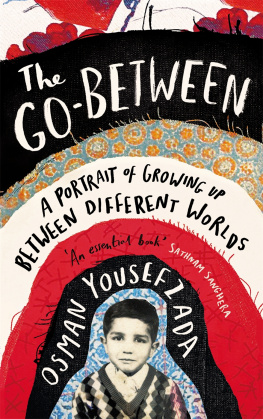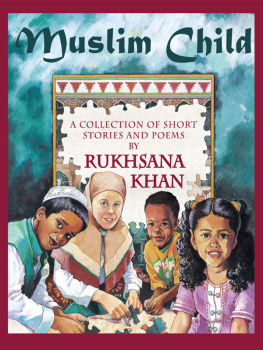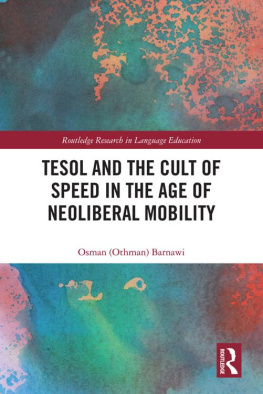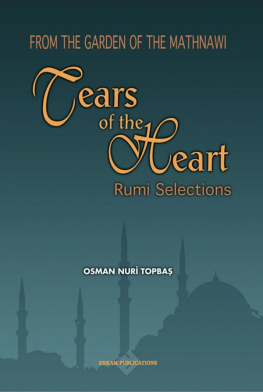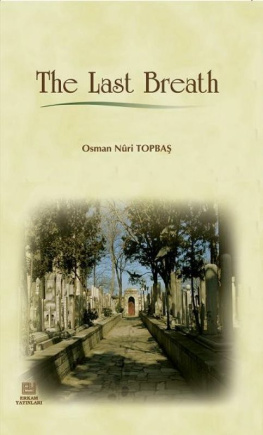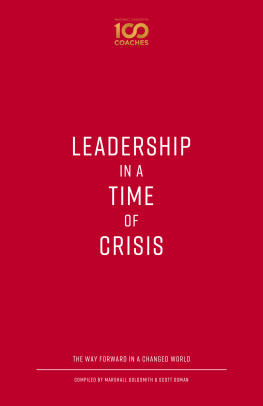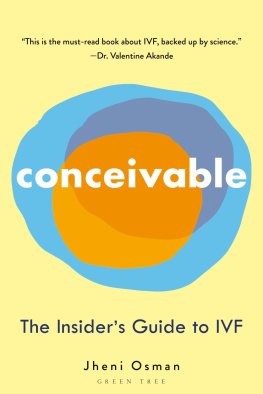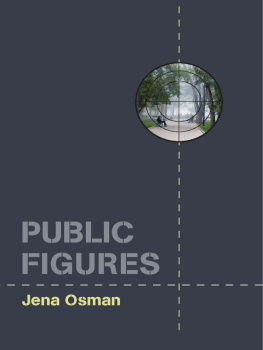Firoza Osman - How to Talk to your Muslim Child about Sex
Here you can read online Firoza Osman - How to Talk to your Muslim Child about Sex full text of the book (entire story) in english for free. Download pdf and epub, get meaning, cover and reviews about this ebook. year: 2020, genre: Children. Description of the work, (preface) as well as reviews are available. Best literature library LitArk.com created for fans of good reading and offers a wide selection of genres:
Romance novel
Science fiction
Adventure
Detective
Science
History
Home and family
Prose
Art
Politics
Computer
Non-fiction
Religion
Business
Children
Humor
Choose a favorite category and find really read worthwhile books. Enjoy immersion in the world of imagination, feel the emotions of the characters or learn something new for yourself, make an fascinating discovery.
- Book:How to Talk to your Muslim Child about Sex
- Author:
- Genre:
- Year:2020
- Rating:4 / 5
- Favourites:Add to favourites
- Your mark:
- 80
- 1
- 2
- 3
- 4
- 5
How to Talk to your Muslim Child about Sex: summary, description and annotation
We offer to read an annotation, description, summary or preface (depends on what the author of the book "How to Talk to your Muslim Child about Sex" wrote himself). If you haven't found the necessary information about the book — write in the comments, we will try to find it.
How to Talk to your Muslim Child about Sex — read online for free the complete book (whole text) full work
Below is the text of the book, divided by pages. System saving the place of the last page read, allows you to conveniently read the book "How to Talk to your Muslim Child about Sex" online for free, without having to search again every time where you left off. Put a bookmark, and you can go to the page where you finished reading at any time.
Font size:
Interval:
Bookmark:
HOW TO TALK TO YOUR MUSLIM CHILD ABOUT SEX
Firoza Osman
Book design by: Rabia Akter
Copyright 2020 by Firoza Osman
All rights reserved. No part of this book may be used or reproduced by any means, graphic, electronic, or mechanical, including photocopying, recording, taping, or by any information storage retrieval system, without the written permission of the publisher except in the case of brief quotations embodied in critical articles and reviews.
CONTENTS
Dreading it! I think that's what first comes to mind when we consider talking to our children about sex. It is hard for parents and children to think of one another as sexual beings, so the conversation is always a little awkward.
I remember starting junior high, aged 12-years-old, saddened by the fact that nobody was playing games in the playground. The fact that I was still interested in skipping and hopscotch seems a world away from 12-year-old Muslim youths asking me about oral sex and pornography. I've seen 12-year-olds in relationships, vaping, and some whove even faced school suspension for coming in under the influence of drugs. Times have changed.
I was teaching sex education in the UK, and one of the sessions included a condom demonstration. There were two hijabis in that session who participated minimally, probably due to shyness and modesty. However, at the end of the year, there were two students pregnant in that class, and they were the two Muslim girls. American Muslim organization, Heart Women & Girls state that sexual experimentation, sexual violence and marital challenges may result from the lack of open dialogue and education about sexual health in our Muslim communities.1
A friends twin nephews in the UK were 11-years-old when someone from an outside agency came in and taught them some games to take out to the playground. They were meant to teach the games to their peers in order to combat the fact that this generation of children growing up with smartphones lacks in imaginative play. The internet is a fantastic tool, but it has come at a cost, especially for children and youth.
Parenting in the age of social media has presented parents with a whole new set of challenges, most notably the decline of moral values. We are living in the most sexualized time ever known and the generation gap experienced today is unlike any other time in history. It is even worse than when my children, now 22- and 24-years-old, were growing up. I remember trying very hard to preserve the childhood innocence of my sons against a tide pulling them in the opposite direction. I used to rent the series Little House on the Prairie and other similar shows and movies because they depicted decency and good morals. I also read books to them that did the same. However, I realized early on that you cant cocoon your children away from the worst parts of life.
Raising young children is physically demanding, and I remember thinking it would get easier as they got older. Yes, it's not as physically demanding, but it becomes more emotionally taxing. There are so many things tugging at us.
Questions like Am I doing okay with my parenting? Why is my child becoming so rude? How can I make sure they feel okay being Muslim? How do I navigate the teen years when they want to do what others are doing? Am I making life more difficult for them by saying no and opening them up to ridicule? and How can I make them stop playing videogames all the time? will dominate your thoughts.
Allah has blessed adolescents with curiosity. On a positive note, this is the age they become passionate about the environment or animal rights and become vegetarian or develop an interest in other important issues. On the negative side, this curiosity also makes them want to see naked bodies, know how it feels to get high or drunk or have a girlfriend/boyfriend.
There are so many things that cause inner conflict when raising children. We need to allow them to have a social life and also accept that the socializing cannot be controlled by a certain age. I did not allow any X-box/PlayStation games aside from sports or strategy games. However, when my sons were invited to birthday parties or to play at friends' homes, especially as they got older, I had less control over what they played or watched there. That feeling of helplessness was real. Once an image is seen, it can't be unseen. You may be taking care of what your children are watching, but it doesn't mean that other parents, including Muslims, are on the same page. I used to pay attention to ratings on videogames and movies but discovered that some parents did not.
When my sons were in elementary school, I always invited friends and parents over first to get to know them, and I did not hesitate to let the parents know my rules on TV and video games. Once my sons moved school, at 12 years of age, I no longer always knew the parents of their friends, and so found it more difficult to initiate these conversations. I feared my sons would be made fun of if I called the parents ahead of time to discuss my rules, and this resulted in them playing age-inappropriate games at friends' houses on occasion. I know this because they told me so. I would then remind them of the values portrayed in those games and how they arent good for us. Unfortunately, I lacked the courage to call those parents and set boundaries for my children. As an antidote to this, I got my sons involved with sports and music lessons, which widened their social circles and kept them busy. When my sons were university bound, I asked them why they didnt have much interest in gaming and they responded that because they werent allowed to play the games others were playing, they hadnt become addicted to gaming. Plus, they had developed other interests like playing sports and musical instruments.
When my son was at the end of Year 7 in the UK (equivalent to Grade 7 in Canada), the end of school movie was scheduled to be John Tucker Must Die. The name alone sounded suspect. John is a popular basketball player and serial cheater. Three girls he dated decide to teach him a lesson by having a new girl seduce and then dump him. Further antics are carried out to humiliate him. The theme of bullying is presented as entertainment.
In the movie, the high school girls wear skimpy clothing; one of them undresses in front of the camera for John; and boys wear thong underwear. There are some kissing and petting scenes, as well as references to STIs (sexually transmitted infections). Slang includes the word slut, and uncork and pork, referring to the boys' dating strategy. The most disturbing part is that the movie suggestion came from teachers at the school.
When I found out this was the movie of choice, I watched it and found it inappropriate. Boys are studs, girls are mean bullies, and the whole movie was sexually inappropriate. I phoned the school, and an administrator told me that I was the only parent that complained. I responded that other parents would assume that the school would show something age-appropriate, but I wouldnt take that for granted. Well, the principal took the movie home, watched it, and agreed with me. The movie was switched to High School Musical. This incident is an example of the fact that the wider society is not looking after the best interests of our children. You, parents, need to make yourselves aware and be your child's advocates.
I wish I had known more about how to parent in this era when I had my children. I began conversations too late. My sons should have grown up with the correct sexual language and a more open dialogue. It was only when my elder son went to Year 7 and asked me what masturbation and a 69 was that I realized they shouldnt be finding out about these topics outside our home. I assumed their dad was taking care of these difficult conversations, including pornography, but I should have checked in with them more often.
Next pageFont size:
Interval:
Bookmark:
Similar books «How to Talk to your Muslim Child about Sex»
Look at similar books to How to Talk to your Muslim Child about Sex. We have selected literature similar in name and meaning in the hope of providing readers with more options to find new, interesting, not yet read works.
Discussion, reviews of the book How to Talk to your Muslim Child about Sex and just readers' own opinions. Leave your comments, write what you think about the work, its meaning or the main characters. Specify what exactly you liked and what you didn't like, and why you think so.

